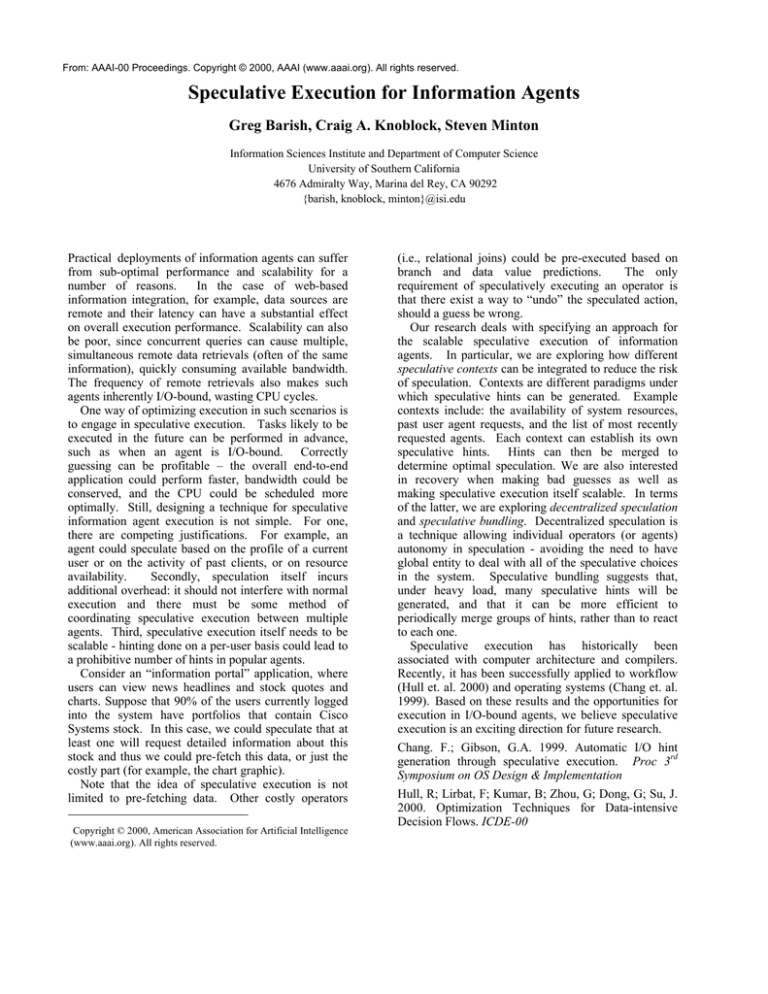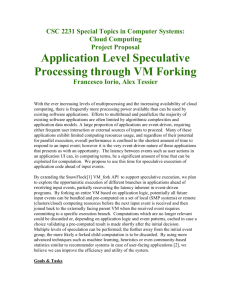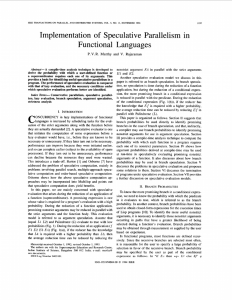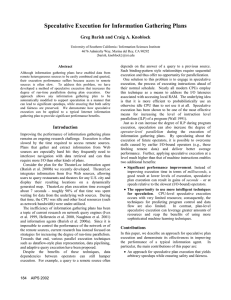Speculative Execution for Information Agents
advertisement

From: AAAI-00 Proceedings. Copyright © 2000, AAAI (www.aaai.org). All rights reserved.
Speculative Execution for Information Agents
Greg Barish, Craig A. Knoblock, Steven Minton
Information Sciences Institute and Department of Computer Science
University of Southern California
4676 Admiralty Way, Marina del Rey, CA 90292
{barish, knoblock, minton}@isi.edu
Practical deployments of information agents can suffer
from sub-optimal performance and scalability for a
number of reasons.
In the case of web-based
information integration, for example, data sources are
remote and their latency can have a substantial effect
on overall execution performance. Scalability can also
be poor, since concurrent queries can cause multiple,
simultaneous remote data retrievals (often of the same
information), quickly consuming available bandwidth.
The frequency of remote retrievals also makes such
agents inherently I/O-bound, wasting CPU cycles.
One way of optimizing execution in such scenarios is
to engage in speculative execution. Tasks likely to be
executed in the future can be performed in advance,
such as when an agent is I/O-bound. Correctly
guessing can be profitable – the overall end-to-end
application could perform faster, bandwidth could be
conserved, and the CPU could be scheduled more
optimally. Still, designing a technique for speculative
information agent execution is not simple. For one,
there are competing justifications. For example, an
agent could speculate based on the profile of a current
user or on the activity of past clients, or on resource
availability.
Secondly, speculation itself incurs
additional overhead: it should not interfere with normal
execution and there must be some method of
coordinating speculative execution between multiple
agents. Third, speculative execution itself needs to be
scalable - hinting done on a per-user basis could lead to
a prohibitive number of hints in popular agents.
Consider an “information portal” application, where
users can view news headlines and stock quotes and
charts. Suppose that 90% of the users currently logged
into the system have portfolios that contain Cisco
Systems stock. In this case, we could speculate that at
least one will request detailed information about this
stock and thus we could pre-fetch this data, or just the
costly part (for example, the chart graphic).
Note that the idea of speculative execution is not
limited to pre-fetching data. Other costly operators
Copyright © 2000, American Association for Artificial Intelligence
(www.aaai.org). All rights reserved.
(i.e., relational joins) could be pre-executed based on
branch and data value predictions.
The only
requirement of speculatively executing an operator is
that there exist a way to “undo” the speculated action,
should a guess be wrong.
Our research deals with specifying an approach for
the scalable speculative execution of information
agents. In particular, we are exploring how different
speculative contexts can be integrated to reduce the risk
of speculation. Contexts are different paradigms under
which speculative hints can be generated. Example
contexts include: the availability of system resources,
past user agent requests, and the list of most recently
requested agents. Each context can establish its own
speculative hints. Hints can then be merged to
determine optimal speculation. We are also interested
in recovery when making bad guesses as well as
making speculative execution itself scalable. In terms
of the latter, we are exploring decentralized speculation
and speculative bundling. Decentralized speculation is
a technique allowing individual operators (or agents)
autonomy in speculation - avoiding the need to have
global entity to deal with all of the speculative choices
in the system. Speculative bundling suggests that,
under heavy load, many speculative hints will be
generated, and that it can be more efficient to
periodically merge groups of hints, rather than to react
to each one.
Speculative execution has historically been
associated with computer architecture and compilers.
Recently, it has been successfully applied to workflow
(Hull et. al. 2000) and operating systems (Chang et. al.
1999). Based on these results and the opportunities for
execution in I/O-bound agents, we believe speculative
execution is an exciting direction for future research.
Chang. F.; Gibson, G.A. 1999. Automatic I/O hint
generation through speculative execution. Proc 3rd
Symposium on OS Design & Implementation
Hull, R; Lirbat, F; Kumar, B; Zhou, G; Dong, G; Su, J.
2000. Optimization Techniques for Data-intensive
Decision Flows. ICDE-00









